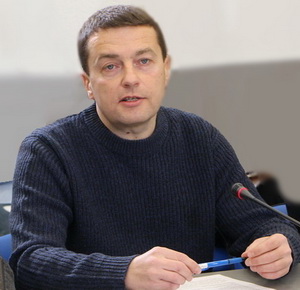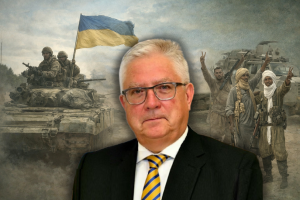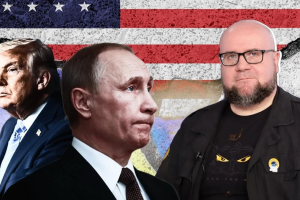 Oleksandr Reznik, D.Sc. in Sociology, Head of the Department of Social and Political Processes of Institute of Sociology NAS of Ukraine, Head of the Center for Political Sociology
Oleksandr Reznik, D.Sc. in Sociology, Head of the Department of Social and Political Processes of Institute of Sociology NAS of Ukraine, Head of the Center for Political Sociology
The course of the conflict in Donbas as a part of a hybrid war between Ukraine and Russia depends not least on the attitude of Ukrainians to the possible settlement options.
It is public opinion on these issues that has become the determining factor in President Volodymyr Zelenskyi's policy. However, the results of polls in Ukraine are often manipulatively interpreted by the Russian propaganda as a "war fatigue" among the Ukrainians who are willing to make concessions to Russia.
These manipulations are based on the interpretation of questions with many answer options, although they cannot be treated as a determined public voice in favor of "continuation of the war" or "capitulation".
Therefore, there is a need to analyze these answer options by defining collective identities. After all, people's choice of a particular answer option is driven by a set of different social identities. We will look at how attitudes toward the entire spectrum of the Ukrainian-Russian war aspects are determined by geopolitical orientations and linguistic-ethnic identities.
The comparison of respondents with different identities who chose certain options of possible government policy on occupied Donbas will help to see the true number of those who support compromising or uncompromising solutions.
In addition, there is a substantial group of people who cannot make up their minds about this problem. An analysis of this group in the context of different identities will show the potential of uncertain respondents to join a particular policy on the occupied Donbas.
The goal of the study is to find out the geopolitical orientations and linguistic identities of the Ukrainian citizens who have chosen different policy options regarding the occupied territories of Donbas.
The study objectives are:
1) empirical examination of the support for the different options to achieve peace in Donbas, including local elections in the occupied territories, and possible actions if agreements fail;
2) studying nexus between geopolitical orientations and linguistic identities of respondents and their reactions about policy options toward the occupied Donbas.
The empirical analysis was carried out on the basis of the nationwide survey conducted by Ilko Kucheriv Democratic Initiatives Foundation in collaboration with the Center for Political Sociology on November 3–16, 2020. A total of 2002 respondents were surveyed on the sample representing the adult population of Ukraine (excluding the occupied territories). The sample is representative of such indicators as gender, age, type of settlement, and region of residence. The maximum random sampling error does not exceed 2.2%. The research toolkit uses indicators that reflect questions about the ways to achieve peace in Donbas, holding local elections in the occupied territories and further actions if agreements fail.
Ways to achieve lasting peace in Donbas
When asked about ways of achieving lasting peace in Donbas, about a fifth of the sample is inclined to make concessions to the separatists and the Russian leadership.
Meanwhile, 45.1% of the respondents chose the answer options that can generally be summed up as an uncompromising refusal to make concessions.
Less than a third are undecided on this issue.
The position when the liberation of Donbas is conditioned by the recognition of the annexation of Crimea was chosen by only 2.6% of respondents.
Table 1
Answers of the population of Ukraine to the question "How, in your opinion, can a lasting peace be achieved in Donbas?"
Answer options | % |
By conducting direct negotiations with the "DNR" and "LNR", recognizing them as the legitimate authorities in separate areas of the Donetsk and Luhansk Oblasts | 10.4 |
By negotiating with the Russian leadership and making concessions, agreeing to the autonomy of Donbas | 8.7 |
By negotiations, agreeing to the annexation of Crimea in exchange for the complete liberation of Donbas | 2.6 |
By continuing diplomatic pressure on Russia and the "DNR" and "LNR", strengthening all possible sanctions | 9.5 |
By strengthening the economic and military potential of Ukraine, complete isolation of the occupied territories | 23.8 |
By systematically preparing the state and society for the liberation of the occupied territories | 11.8 |
Other | 1.9 |
Hard to say | 31.3 |
The analysis of the geopolitical orientations of respondents, who chose different options for achieving peace in Donbas, was based on the distribution of answers "accession to the European Union", "accession the Eurasian Economic Union (with Russia, Belarus, Kazakhstan)", "not joining any union" and "hard to say" (table 2).
Table 2
Geopolitical orientations of respondents who answered the question about ways to achieve peace in Donbas, %
Ways to achieve lasting peace | Which integration direction should Ukraine choose? | ||||
Accession to the EU | Accession to the EurAsEC | Not joining any union | Hard to say | TOTAL | |
By conducting direct negotiations with the "DNR" and "LNR", recognizing them as the legitimate authorities in separate areas of the Donetsk and Luhansk Oblasts | 18.4 | 41.1 | 30.9 | 9.7 | 100.0 |
By negotiating with the Russian leadership and making concessions, agreeing to the autonomy of Donbas | 21.3 | 35.1 | 31.0 | 12.6 | 100.0 |
By negotiations, agreeing to the annexation of Crimea in exchange for the complete liberation of Donbas | 51.0 | 27.5 | 13.7 | 7.8 | 100.0 |
By continuing diplomatic pressure on Russia and the "DNR" and "LNR", strengthening all possible sanctions | 74.7 | 4.2 | 13.7 | 7.4 | 100.0 |
By strengthening the economic and military potential of Ukraine, complete isolation of the occupied territories | 66.7 | 3.2 | 22.1 | 8.1 | 100.0 |
By systematically preparing the state and society for the liberation of the occupied territories | 61.3 | 5.1 | 25.5 | 8.1 | 100.0 |
Hard to say | 43.1 | 9.8 | 28.8 | 18.3 | 100.0 |
Respondents who are inclined to make concessions through direct negotiations with the "DNR" and "LNR" or with the Russian leadership are more oriented towards the pro-Russian direction or not joining any union. Interestingly, among those surveyed who agreed to the liberation of Donbas in exchange for the recognition of the annexation of Crimea, more than half are oriented towards Ukraine's accession to the EU. However, there are also 27.5% among them who are oriented towards the EurAsEC.
At the same time, most respondents who chose uncompromising options for the liberation of Ukrainian territories are in favor of Ukraine's European integration. It is noteworthy that respondents who are undecided about policy on Donbas are also more inclined to the European integration or less inclined to not joining any union, but they are least inclined to Eurasian integration.
The distribution of respondents who chose different options for achieving peace in Donbas by the dimension of linguistic identity (the language they consider their native language) showed significant differences (table 3).
Table 3
Linguistic identity of respondents who answered the question about ways to achieve peace in Donbas, %
Ways to achieve lasting peace | What language do you consider native? | ||||
Ukrainian | Russian | Another | Hard to answer | IN TOTAL | |
By conducting direct negotiations with the "DNR" and "LNR", recognizing them as the legitimate authorities in separate areas of the Donetsk and Luhansk Oblasts | 34.8 | 60.9 | 1.4 | 2.9 | 100.0 |
By negotiating with the Russian leadership and making concessions, agreeing to the autonomy of Donbas | 49.4 | 49.4 | 0.6 | 0.6 | 100.0 |
By negotiations, agreeing to the annexation of Crimea in exchange for the complete liberation of Donbas | 60.8 | 37.3 | 0.0 | 2.0 | 100.0 |
By continuing diplomatic pressure on Russia and the "DNR" and "LNR", strengthening all possible sanctions | 81.6 | 16.8 | 0.0 | 1.6 | 100.0 |
By strengthening the economic and military potential of Ukraine, complete isolation of the occupied territories | 87.3 | 11.8 | 0.4 | 0.4 | 100.0 |
By systematically preparing the state and society for the liberation of the occupied territories | 77.9 | 19.6 | 0.9 | 1.7 | 100.0 |
Hard to say | 74.8 | 21.2 | 1.0 | 3.1 | 100.0 |
Approximately two-thirds of respondents who agree to the achievement of peace through direct negotiations with the "DNR" and "LNR," recognizing them as the legitimate authorities, have Russian linguistic identity and only a third — Ukrainian.
Respondents who are inclined to negotiations with the Russian leadership and granting autonomy to Donbas are divided evenly: half of them choose Ukrainian as their native language, and half choose the Russian language.
Majority (about two-thirds) of respondents who agree with the liberation of Donbas at the cost of recognizing the annexation of Crimea, demonstrate Ukrainian linguistic identity and slightly more than a third — Russian.
Expectedly, respondents who chose uncompromising policy options on Donbas, have the Ukrainian linguistic identity. However, three fourths of undecided respondents regarding policy on Donbas are also Ukrainian language native speakers while others undecided consider the Russian language as their native one.
Holding elections in the occupied Donbas
Taking into account responses to the question about holding local elections in the uncontrolled territory of ORDLO, majority of the population was inclined to uncompromising options (table 4).
Table 4
Answers of the population of Ukraine to the question "How do you feel about the prospect of holding local elections in the territories of Donetsk and Luhansk Oblasts that are not controlled by Ukraine (the so-called "DNR" and "LNR")"?
Answer options | % |
We need to agree to local elections, because it will accelerate peace | 16.5 |
Elections in these territories can be held when Russian troops withdraw and the disarmament of militants takes place | 16.3 |
Elections can be held only a few years after the return of these territories to Ukraine | 21.9 |
It is impossible to hold elections because these territories are lost to Ukraine | 13.9 |
Hard to say | 31.5 |
Only 16.5% of those surveyed agreed to the local elections in the occupied territories for the sake of peace, while less than a third were undecided on this issue.
About 14% were pessimistic about the elections, since they thought these territories were lost forever. If we combine those who accept local elections only after demilitarization and full return of Ukrainian sovereignty to these territories, the support of an uncompromising position towards local elections is shared by 38.2% of Ukrainians.
The issue of local elections in Donbas predictably differentiated respondents by geopolitical orientations (table 5).
Table 5
Geopolitical orientations of respondents who expressed their opinions regarding local elections in occupied Donbas, %
Opinions regarding local elections in the occupied Donbas | Which integration direction should Ukraine choose? | ||||
Accession to the EU | Accession to the EurAsEC | Not joining any union | Hard to say | IN TOTAL | |
We need to agree to local elections, because it will accelerate peace | 27.6 | 31.5 | 35.2 | 5.8 | 100.0 |
Elections in these territories can be held when Russian troops withdraw and the disarmament of militants takes place | 59.7 | 5.2 | 24.3 | 10.8 | 100.0 |
Elections can be held only a few years after the return of these territories to Ukraine | 70.0 | 3.4 | 19.7 | 6.9 | 100.0 |
It is impossible to hold elections because these territories are lost to Ukraine | 40.6 | 21.7 | 28.6 | 9.1 | 100.0 |
Hard to say | 44.9 | 11.3 | 22.9 | 20.9 | 100.0 |
Unconditional local elections are supported by respondents, among whom there is less support for Ukraine's European integration and greater support for Ukraine's accession to the EurAsEC or not joining any union.
Majority of the proponents of uncompromising options supports Ukraine's accession to the European Union.
People claiming that it is impossible to hold local elections since these territories have been lost are divided: 45% of them back the European integration, 22% choose the Eurasian integration and 29% do not want to join any union.
Similarly, the largest share (44.9%) of undecided respondents is oriented toward the European Union, others either do not support any union or have no idea what to choose.
The distribution of groups of respondents who chose certain options for local elections in Donbas recorded differences based on the indicator of the native language (table 6).
Table 6
Linguistic identity of respondents who expressed their opinions regarding local elections in occupied Donbas, %
Ways to achieve lasting peace | What language do you consider native? | ||||
Ukrainian | Russian | Another | Hard to answer | IN TOTAL | |
We need to agree to local elections, because it will accelerate peace | 46.1 | 51.5 | 0.9 | 1.5 | 100.0 |
Elections in these territories can be held when Russian troops withdraw and the disarmament of militants takes place | 83.1 | 15.1 | 0.6 | 1.2 | 100.0 |
Elections can be held only a few years after the return of these territories to Ukraine | 84.0 | 13.5 | 0.7 | 1.8 | 100.0 |
It is impossible to hold elections because these territories are lost to Ukraine | 64.0 | 32.4 | 0.7 | 2.9 | 100.0 |
Hard to say | 73.9 | 22.7 | 0.6 | 2.7 | 100.0 |
Among the proponents of unconditional consent to local elections there are slightly more of those who declared Russian as their native language. On the other hand, most of the proponents of uncompromising options have Ukrainian linguistic identity. Among the group of respondents who think that the occupied territories are lost and elections are impossible, two-thirds were Ukrainian-speaking and one-third Russian-speaking people. Respondents who choose Ukrainians as native language also dominate among the undecided.
Ukraine's actions in Donbas in case peace agreements failure
The results of Ukrainians' responses to the question "If there is no agreement on peace in Donbas in the near future, which actions on the part of Ukraine would you approve?" did not record the dominant variant (table 7). One third of the respondents were undecided on this issue. A small share of population (12.8%) approved the continuation of negotiations and making progress, even at the cost of the new Ukraine’s concessions. Almost a fifth (18.5%) of respondents agreed to continue negotiations on condition of the concessions from Russia and a similar share of respondents (18.2%) is oriented toward limited talks on humanitarian issues. 33.4% of respondents have difficulty to answer this question.
Table 7
Answers of Ukraine's population to the question "If there is no agreement on peace in Donbas in the near future, which actions on the part of Ukraine would you approve?"
Answer options | % |
Continuation of negotiations and making progress even at the cost of new concessions | 12.8 |
Continuation of negotiations if Russia demonstrates the ability to make concessions | 18.5 |
Reducing negotiations exclusively to issues of coexistence with the temporarily occupied areas and humanitarian affairs (exchange of prisoners) | 18.2 |
A de facto suspension of negotiations until better times | 14.7 |
Other | 2.5 |
Hard to say | 33.4 |
An analysis of the geopolitical orientations of respondents who expressed opinions about Ukraine's actions in Donbas revealed significant differences (table 8).
Table 8
Geopolitical orientations of respondents who expressed opinions on Ukraine's actions in Donbas considering there are no agreements, %
Actions of Ukraine considering there are no peace agreements | Which integration direction should Ukraine choose? | ||||
Accession to the EU | Accession to the EurAsEC | Not joining any union | Hard to say | IN TOTAL | |
Continuation of negotiations and making progress even at the cost of new concessions | 22.4 | 39.2 | 28.6 | 9.8 | 100.0 |
Continuation of negotiations if Russia demonstrates the ability to make concessions | 45.1 | 16.0 | 29.1 | 9.8 | 100.0 |
Reducing negotiations exclusively to issues of coexistence with the temporarily occupied areas and humanitarian affairs (exchange of prisoners) | 68.8 | 3.6 | 18.5 | 9.1 | 100.0 |
A de facto suspension of negotiations until better times | 55.8 | 2.7 | 30.8 | 10.6 | 100.0 |
Hard to say | 48.7 | 11.4 | 24.1 | 15.7 | 100.0 |
The biggest share respondents, who approve negotiations even at the cost of new Ukraine’s concessions, back integration into the Eurasian Economic Union (39%). However, 22% of them support Ukraine's accession to the EU and 29% do not favor any union. In contrast, the proponents of reciprocal negotiations which means concessions from Russia, are orientated toward the European integration, and some of them do not support any union. Respondents who support limited negotiations are overwhelmingly focused on the European integration. And half of the undecided respondents also back the European integration.
The distribution of respondents, according to their linguistic identities, is even more precise (table 9).
Table 9
Linguistic identity of respondents who expressed opinions on Ukraine's actions in Donbas considering there are no peace agreements, %
Actions of Ukraine considering there are no peace agreements | What language do you consider native? | ||||
Ukrainian | Russian | Another | Hard to answer | IN TOTAL | |
Continuation of negotiations and making progress even at the cost of new concessions | 41.6 | 54.9 | 0.4 | 3.1 | 100.0 |
Continuation of negotiations if Russia demonstrates the ability to make concessions | 65.0 | 32.0 | 0.5 | 2.4 | 100.0 |
Reducing negotiations exclusively to issues of coexistence with the temporarily occupied areas and humanitarian affairs (exchange of prisoners) | 86.7 | 11.6 | 0.8 | 0.8 | 100.0 |
A de facto suspension of negotiations until better times | 78.6 | 20.4 | 0.7 | 0.3 | 100.0 |
Hard to say | 76.1 | 20.3 | 0.8 | 2.9 | 100.0 |
Among the citizens of Ukraine who support negotiations even at the cost of new concessions there are slightly more people with the Russian linguistic identity. Instead, the majority of proponents of uncompromising actions and undecided have chosen the Ukrainian language as their native.
Conclusions
Geopolitical orientations of the Ukrainians remain the important markers of the national identity and shape individual perception of various political issues.
Similarly, the choice of the native language is a conscious self-identification step. Often people who consider one language as their native one but use a different language in their everyday lives demonstrate their national identity in this way. These existential choices influence the public opinion regarding such important political issues as Ukraine's policy toward the occupied territories in Donbas.
Analysis of the November 2020 poll data showed that only a minority of the population (12-18%) approves making concessions to Russia to achieve peace in Donbas. Meanwhile about half of the population is against any kind of compromises, including the local elections in the occupied territories. And these people are clearly focused on the European integration of Ukraine and have a distinct Ukrainian identity.
It is worth mentioning that almost one third of the undecided citizens also choose the European integration of Ukraine and declare Ukrainian their native language. Thus, if they participate in a hypothetical referendum about policy options toward war in Donbas, they would not support any kind of concessions.








